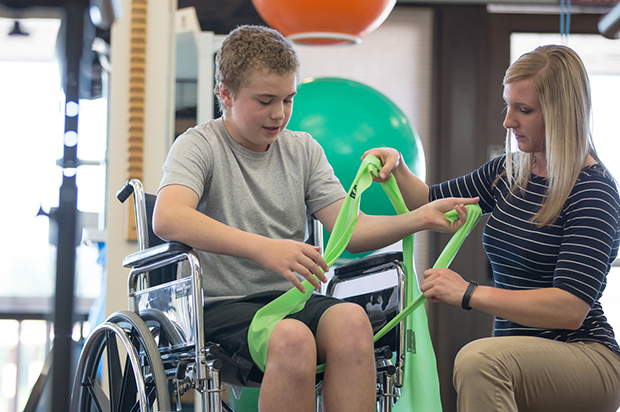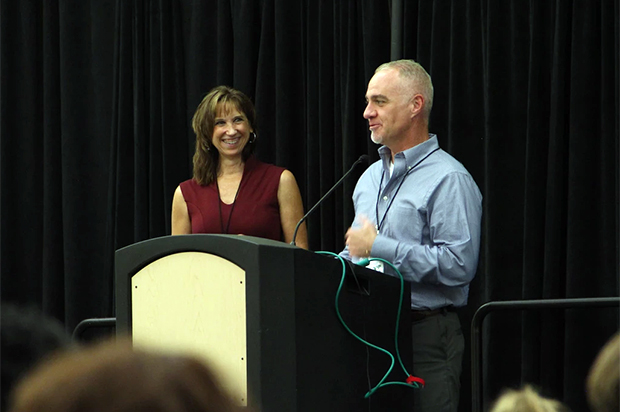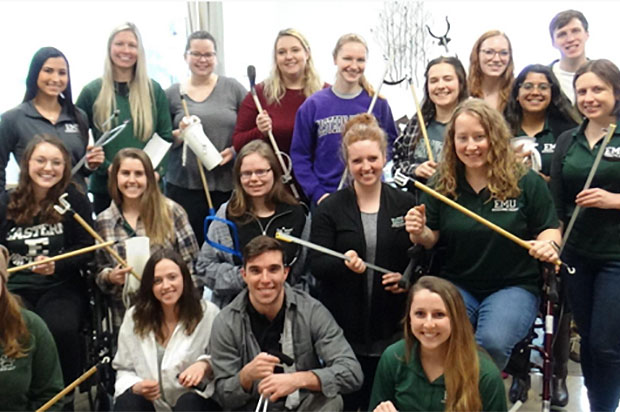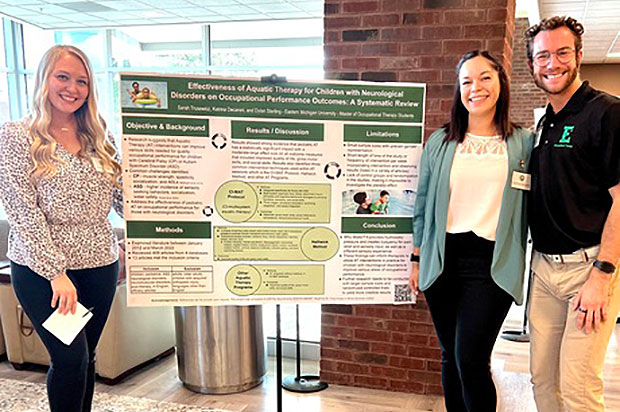Explore this Program
About the Program
Get to know the heart of the OT program by reading the mission, vision and philosophy.
Program Outcomes
See our graduation and National Board for Certification in Occupational Therapy pass rates.
Fieldwork is an integrated part of the OT curriculum and designed to meet the mission and philosophy of the OT program and the Accreditation Council for Occupational Therapy Education (ACOTE) standards. By the end of the fieldwork experience, students will be competent, entry-level, generalist occupational therapists. EMU OT Fieldwork Program is designed to offer three separate Level I (part-time) experiences and two Level II (full-time) experiences.
The level I fieldwork program at EMU provides students with the opportunity to directly connect what they are learning in the classroom to hands-on faculty- led fieldwork experiences.
EMU OT Program curriculum follows a developmental lifespan sequence, supporting students to develop OT practice skills to effectively provide services to clients across the lifespan. Within this structure, fieldwork opportunities provide students exposure to OT practice in three separate Level I experiences in pediatrics, adults, and older adults. To prepare students for level II fieldwork, the level I fieldwork program is designed to increase in rigor for each rotation.
Level I experiences are designed to provide services to community members and provide opportunities for students to immerse themselves in the OT process while being empowered, mentored and coached by an EMU faculty member.
The program at EMU consistently requests student feedback to ensure the student perspective is shared with the faculty.
The second level of OT fieldwork provides students with a supervised full-time experience focused on the application of the academically acquired body of knowledge. Students are supervised by a licensed or registered occupational therapist with a minimum of one year of practice experience and supported by EMU’s Academic Fieldwork Coordinator (AFWC). A minimum of 24 weeks of full-time fieldwork is required for successful completion of the Level II fieldwork experience.
EMU has strong relationships with many community agencies, K-12 education districts, healthcare systems, and other OT service providers in developing quality Level II experiences.
Students are provided information, including prior student evaluations, to level II fieldwork rotations for their fieldwork cycle.
Students meet with the AFWC independently to discuss their interests, learning styles, past experiences and other factors in considering a level II placement. The AFWC supports students during this process and ensures that students have a well rounded level II experience that prepares them to meet the goal of being an entry-level, generalist, OT practitioner.
Students create a prioritized list indicating interest in fieldwork sites, after meeting with the AFWC, and before final placements are made.
Additional information about the fieldwork program is available for fieldwork educators.
In addition to the OT program requirements, students may need to complete other tests, vaccinations and applications dictated by the legal contract process. Students may be responsible for the costs incurred from these requirements. Examples of additional items include:
Placements will be arranged in collaboration with the fieldwork coordinator. The student will be involved in the selection of his/her placements to the greatest extent possible. The method used for placement selection will vary, depending on the availability of spaces and number of students being assigned to fieldwork. The student is expected to honor the assignment to which he/she has been scheduled.
No, you must complete an application for graduation (including payment of fee to cover diploma). Contact the graduate audit office at 734.487.4203 if you have not received this application form.
The application is on the NBCOT website.
Contact EMU Office of Records and Registration.
No. NBCOT's certification is national recognition. For state (Michigan) licensure contact:
Bureau of Health Professions
P.O. Box 30670
Lansing, MI 48909-8170
517.335.0918
Michigan Department of Licensing and Regulatory Affairs
Information about State Policy and Licensure in other states.
The occupational therapy program does not save these materials beyond three years. Save all of your fieldwork information: syllabi, sites and supervisor names. You may later need it for obtaining licensure.
In order to practice as an occupational therapist in Michigan, you must be licensed. You cannot use the titles of OT, OTL, OTRL, OTS, MOTS, occupational therapist (or any similar titles) until you are licensed. There are no titles designated for a person who has graduated from an occupational therapy education program but has not yet received their license.
Try the new American Occupational Therapy Association job website.
Melissa Peters
Academic Fieldwork Coordinator
260 Rackham Hall, Ypsilanti MI 48197
[email protected]
Get to know the heart of the OT program by reading the mission, vision and philosophy.
See our graduation and National Board for Certification in Occupational Therapy pass rates.

Learn about the organizations and scholarships for students in the program.

The Lyla M. Spelbring Endowed Lectureship And Conference is a long-standing tradition.

Read our newsletter and stay involved with OT.

Learn what current students are doing to impact the OT profession.